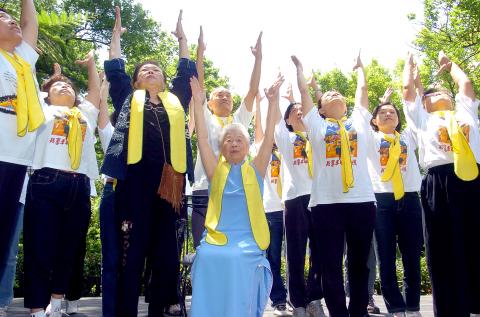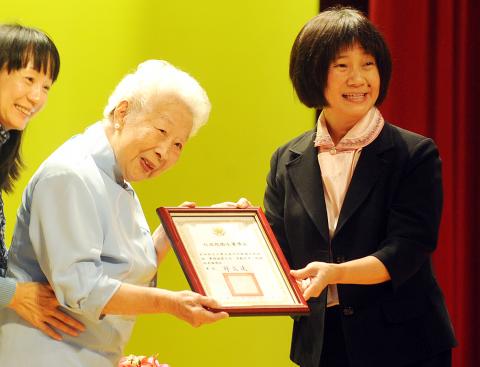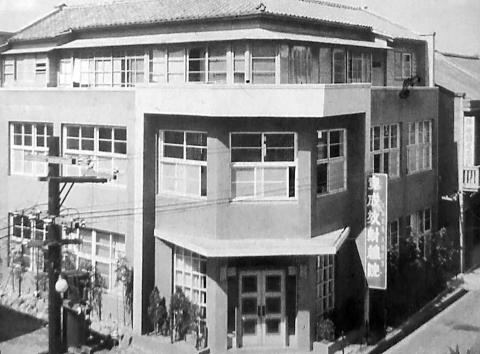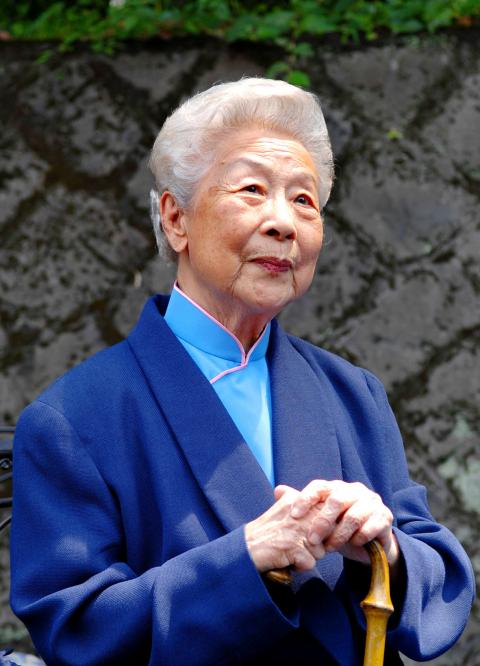Feb. 4 to Feb. 10
As a female, Chuang Shu-chi (莊淑旂) was not supposed to follow her father’s footsteps in practicing traditional Chinese medicine.
Her father desperately wanted a son, but her mother was unable to have any more children after a miscarriage. The family later adopted two boys, and Chuang was deeply affected when she heard her father lament that she would only grow up to be part of someone else’s family.

Photo: Lu Chun-wei, Taipei Times
Chuang says in her biography by historian Hsu Hsueh-chi (許雪姬) that in order to prove that she could help her father, she started secretly studying medicine and learning folk remedies from visitors. So when her father’s assistant suddenly died, a 12-year-old Chuang knew exactly what to do.
That night, Chuang gathered her stepbrothers and correctly prepared the ingredients needed for her father’s tasks the next day. Her surprised father pulled her out of school and started training her at the shop, launching the career of Taiwan’s first licensed female Chinese medicine doctor.
Chuang practiced in Taiwan for only a few years before she fled to Japan, where she gained fame becoming a medical consultant to the imperial family. She returned to Taiwan in 1988 and by the time she died on Feb. 4, 2015, she had gained fame as the “godmother of cancer prevention” and known for tirelessly promoting her “Cancer Prevention Universal Exercise” (防癌宇宙操), a six-minute-per-day routine that she says helps empty stomach gas and promotes circulation and natural energy absorption.

Photo: Tsung Chang-chin, Taipei Times
‘LADY DOCTOR’
It was rare for women to work at medicine shops, but Chuang’s appearance unexpectedly gave the family business a huge boost.
“I was not a beauty, but many believed that if they took medicine prepared by an unmarried girl, their symptoms would alleviate quicker … People even came back to present me with red envelopes and gifts after they got better. The news of a doctor’s daughter who helped prepare medicine quickly spread.”

Photo courtesy of Wikimedia Commons
Chuang’s skills greatly improved under her father’s strict tutelage. When she was about 14, one of her nephews fell ill with fever and pneumonia. The local pediatrician pronounced him incurable and told the family to leave him to die, but Chuang managed to nurse him back to health. Armed with newfound confidence, Chuang writes that she managed to save two more children before she turned 16.
Chuang’s father died of rectal cancer when she was 19. She had gotten married a year previously — World War II was intensifying and her parents hastily found her a husband to avoid being forced by the Japanese into sexual slavery as a comfort woman. Her father was deep in debt when he died, but Chuang and her brothers kept the clinic running.
Her husband also soon died of cancer in 1945, leaving Chuang and five children to fend for themselves. One afternoon in 1950, a family friend visited Chuang and casually asked if she was taking the government exams for Chinese medicine practitioners.

Photo: Lu Chun-wei, Taipei Times
“I had no idea it was going on. That was the last day to register, and I rushed to the registration office only to find out that it required documents that would likely take a whole day to prepare,” she says.
Fortunately, the registration staff allowed her to turn in the documents late. She was too busy to study, but luckily she already knew the material through years of practice.
On Jan. 17, 1951, Chuang became a licensed practitioner. People stopped calling her by her childhood nickname of “Shorty Chi” (矮仔旂) and started referring to her as “Lady Doctor” (查某先生). She also opened the Chingcheng Radiology Clinic (竟成放射線院) to help ease traffic at National Taiwan University hospital, which was often packed as the only institution in Taiwan to have radiology equipment.
FLIGHT TO JAPAN
Business was booming, but the good times wouldn’t last. Chuang’s clinic had a side business purchasing Angelica sinensis (當歸) from Hong Kong for the state-run Taiwan Tobacco and Wine Monopoly Bureau (菸酒公賣局) to produce medicinal wine. However, this violated the wartime and Martial Law era National General Mobilization Law (國家總動員法), which limited the amount of imports one could have to prevent hoarding.
Chuang was arrested by the military police, who held her for 20 days before informing her of her charges. Although she had the documents from the Tobacco and Wine Monopoly Bureau to prove her innocence, the military court sentenced her to three years anyway, causing a furious Chuang to collapse in court from an ulcer. She avoided jail time to treat her illness, but a military court official surnamed Lee (李) frequently blackmailed Chuang’s family for money, threatening to send her back to jail otherwise.
Chuang already had plans to head to Japan to study how to relieve the pain of terminal cancer patients, but now she had to flee Taiwan to avoid further trouble. With the help of a patient who happened to be the father-in-law of Chiang Wei-kuo (蔣緯國), then-president Chiang Kai-shek’s (蔣介石) adopted son, she obtained permission to treat her ulcer in Japan.
With her eldest daughter in tow, Chuang set off in May 1954. Meanwhile, Lee was arrested for blackmailing another woman in the same manner, and was sentenced to death. Chuang remained in Japan for the next three decades, earning her PhD in 1966 and becoming a Japanese household name for serving as medical consultant for Empress Michiko and later the entire imperial family.
Chuang finally returned to Taiwan in 1988, where she continued her work in cancer prevention and treatment. While she announced her retirement in 2009 at the age of 90, she still made a public appearance that year, leading more than 1,000 people in performing her signature exercises in front of Taipei City Hall.
Taiwan in Time, a column about Taiwan’s history that is published every Sunday, spotlights important or interesting events around the nation that have anniversaries this week.

Towering high above Taiwan’s capital city at 508 meters, Taipei 101 dominates the skyline. The earthquake-proof skyscraper of steel and glass has captured the imagination of professional rock climber Alex Honnold for more than a decade. Tomorrow morning, he will climb it in his signature free solo style — without ropes or protective equipment. And Netflix will broadcast it — live. The event’s announcement has drawn both excitement and trepidation, as well as some concerns over the ethical implications of attempting such a high-risk endeavor on live broadcast. Many have questioned Honnold’s desire to continues his free-solo climbs now that he’s a

Lines between cop and criminal get murky in Joe Carnahan’s The Rip, a crime thriller set across one foggy Miami night, starring Matt Damon and Ben Affleck. Damon and Affleck, of course, are so closely associated with Boston — most recently they produced the 2024 heist movie The Instigators there — that a detour to South Florida puts them, a little awkwardly, in an entirely different movie landscape. This is Miami Vice territory or Elmore Leonard Land, not Southie or The Town. In The Rip, they play Miami narcotics officers who come upon a cartel stash house that Lt. Dane Dumars (Damon)

Francis William White, an Englishman who late in the 1860s served as Commissioner of the Imperial Customs Service in Tainan, published the tale of a jaunt he took one winter in 1868: A visit to the interior of south Formosa (1870). White’s journey took him into the mountains, where he mused on the difficult terrain and the ease with which his little group could be ambushed in the crags and dense vegetation. At one point he stays at the house of a local near a stream on the border of indigenous territory: “Their matchlocks, which were kept in excellent order,

Today Taiwanese accept as legitimate government control of many aspects of land use. That legitimacy hides in plain sight the way the system of authoritarian land grabs that favored big firms in the developmentalist era has given way to a government land grab system that favors big developers in the modern democratic era. Articles 142 and 143 of the Republic of China (ROC) Constitution form the basis of that control. They incorporate the thinking of Sun Yat-sen (孫逸仙) in considering the problems of land in China. Article 143 states: “All land within the territory of the Republic of China shall